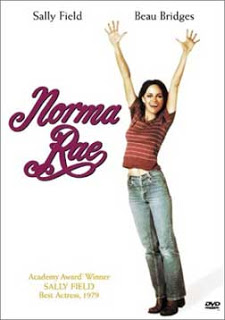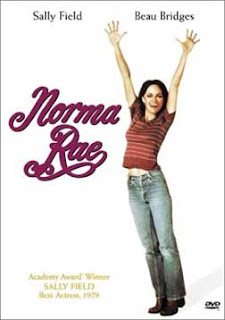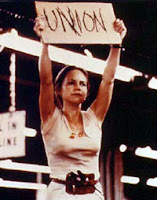Maybe I saw Sidney Lumet’s Network in high school — I remember the “I’m as mad as hell, and I’m not going to take this anymore!” scenes — but I wasn’t prepared to find its satire so brilliant 35 years after its initial release. What I’d completely forgotten was all the other satirical elements, from the sex scenes between Faye Dunaway and William Holden to the subplot of Dunaway’s attempts to sign a group of violent radicals, the Ecumenical Liberation Army, to a TV contract. Considering that it’s a satire of the TV-ification of America I can’t believe it’s so fresh today, and so prescient of what we experienced in television during the last generation. From the opening scenes to the conclusion, this film is perfect.
One of the film’s themes is the generation gap; so how perfect that Holden — anti-hero star of Stalag 17 and Sunset Boulevard, whose cynicism helped create such 1950s anti-establishment protagonists as Holden Caulfield — would play Max, the head of the United Broadcasting Service news division. Now in late middle age, he’s found himself defending principles and idealism against the über-cynical corporate types who are taking over UBS. Of these, Diana (Dunaway) is the worst: a gorgeous series programmer with a preternatural gift for repackaging TV to get a bigger market share. She can see that “the American people are turning sullen. They’ve been clobbered on all sides by Vietnam, Watergate, the inflation, the depression; they’ve turned off, shot up, and they’ve fucked themselves limp, and nothing helps.” Whereas Max and his news anchor, Howard Beale (Peter Finch) joke darkly about a new program like “Terrorist of the Week”:
Max: We could make a series of it. “Suicide of the Week.” Aw, hell, why limit ourselves? “Execution of the Week.”
Howard: “Terrorist of the Week.”
Max: I love it. Suicides, assassinations, mad bombers, Mafia hitmen, automobile smash-ups: “The Death Hour.” A great Sunday night show for the whole family. It’d wipe that fuckin’ Disney right off the air.
Diana is utterly serious about such plans. She hires a radical black commie feminist to wrangle the crazy members of the Ecumenical Liberation Army into creating a popular new show (the scene of their contract negotiations is worth a Netflix subscription). Most of all, Diana can see that the newly insane Howard, with his TV rants about all the bullshit in American society, can be repackaged as The Mad Prophet for a new-and-improved news hour that also features Sybil the Soothsayer. Diana is television: for her, all publicity is good publicity, all political agendas can be transformed into catnip for audiences, there is no meaningful distinction between news and amusement. She doesn’t care in the least that Howard tells viewers to turn off their televisions, because she knows that his show gets more viewers than any competitor.
Even more dark is the film’s portrayal of Howard, who really is saying something important about TV — even though no one pays any attention:
Man, you’re never going to get any truth from us. We’ll tell you anything you want to hear; we lie like hell. We’ll tell you that, uh, Kojak always gets the killer, or that nobody ever gets cancer at Archie Bunker’s house, and no matter how much trouble the hero is in, don’t worry, just look at your watch; at the end of the hour he’s going to win. We’ll tell you any shit you want to hear. We deal in illusions, man! None of it is true! But you people sit there, day after day, night after night, all ages, colors, creeds… we’re all you know. You’re beginning to believe the illusions we’re spinning here. You’re beginning to think that the tube is reality, and that your own lives are unreal. You do whatever the tube tells you! You dress like the tube, you eat like the tube, you raise your children like the tube, you even think like the tube! This is mass madness, you maniacs! In God’s name, you people are the real thing! WE are the illusion! So turn off your television sets. Turn them off now. Turn them off right now. Turn them off and leave them off! Turn them off right in the middle of the sentence I’m speaking to you now! TURN THEM OFF… (He collapses in a faint on the set. The studio audience explodes with applause and cheers; the studio cameras pan out from his limp body.)
They don’t turn off their sets, as Diana well knows; they can hardly wait for more. The script by Paddy Chayefsky — his third to win an Oscar for Best Screenplay — is perfect at every turn. When I watched this last night with my friend Susan, we commented on one of those mini-moments in which Diana’s assistant (a very young Conchata Ferrell) pitches ideas for new series:
The first one is set at a large Eastern law school, presumably Harvard. The series is irresistibly entitled “The New Lawyers.” The running characters are a crusty-but-benign ex-Supreme Court justice, presumably Oliver Wendell Holmes by way of Dr. Zorba; there’s a beautiful girl graduate student; and the local district attorney who is brilliant and sometimes cuts corners. The second one is called “The Amazon Squad.” The running characters include a crusty-but-benign police lieutenant who’s always getting heat from the commissioner; a hard-nosed, hard-drinking detective who thinks women belong in the kitchen; and the brilliant and beautiful young girl cop who’s fighting the feminist battle on the force. Up next is another one of those investigative reporter shows. A crusty-but-benign managing editor who’s always gett… (Diana cuts her off there.)
No wonder the film won so many awards. Watch it again — it’s gone right up to my list of Best Films Ever.
Feminéma is a blog about feminism, cinéma, and popular culture kept by Didion, a university professor in Texas. This blog is my way to address the achingly slow progress women are making toward social and financial equality, as film is a vivid place to see how women so frequently appear as stereotypes onscreen and only rarely appear in powerful roles like director, producer, and screenwriter. Please read!




